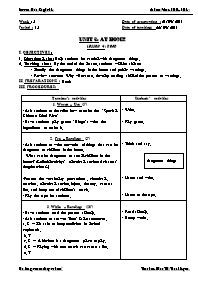Giáo án môn Tiếng Anh Lớp 8 - Unit 3: At home - Lesson 4: Read

2. Pre – Reading: (5’)
- Ask students to write networks of things that can be dangerous to children in the home.
What can be dangerous to small children in the home? (Knife/electricity/ electrical sockets/scissors/ drug/matches/ )
-Present the vocabulary precautions, chemicals, matches, electrical socket, injure, destroy, cause a fire, and keep out of children’s reach.
- Play the tape for students.
Bạn đang xem tài liệu "Giáo án môn Tiếng Anh Lớp 8 - Unit 3: At home - Lesson 4: Read", để tải tài liệu gốc về máy bạn click vào nút DOWNLOAD ở trên
Week: 5 Date of preparation:21/ 09/ 2011 Period: 15 Date of teaching: 22/ 09/ 2011 UNIT 3: AT HOME LESSON 4: READ I. OBJECTIVES: 1. Educational aim: Help students be careful with dangerous things. 2. Teaching aims: By the end of the lesson, students will be able to: - Identify the dangerous things in the home and public warnings. - Review structure Why –Because, develop reading skill of the posters or warnings. II. PREPARATIONS: Book III. PROCEDURES: Teacher’s activities Students’ activities 1. Warm – Up: (5’) - Ask students to describe how to make the “Special Chinese Fried Rice” - Have students play game: “Bingo”: write the ingredients to make it. 2. Pre – Reading: (5’) - Ask students to write networks of things that can be dangerous to children in the home. What can be dangerous to small children in the home? (Knife/electricity/ electrical sockets/scissors/ drug/matches/) -Present the vocabulary precautions, chemicals, matches, electrical socket, injure, destroy, cause a fire, and keep out of children’s reach. - Play the tape for students. 3. While – Reading: (20’) - Have students read the posters silently. - Ask students to answer True/ False sentences. a. F ª It is safe to keep medicine in locked cupboards. b. T c. F ª A kitchen is a dangerous place to play. d. F ª Playing with one match can cause a fire. e. T f. T - Ask students to correct the wrong sentences. - Ask students to read the poster again. - Ask students the questions about the poster. a. Why must we put all chemicals and drugs in locked cupboards? b. Why mustn’t we let children play in the kitchen? c. Why mustn’t children play with a match? d. Why must we cover electrical covers? e. Why do we have to all dangerous objects out of children’s reach? - Check and correct the answers. a. Because children often try to eat and drink them. b. Because the kitchen is a dangerous place. c. Because playing with matches can cause a fire. d. Because children mustn’t put anything into electrical sockets. Electricity can kill. e. Because they can injure or kill children. - Call some students to practice in pairs. - Remind students of the grammar note: Why _ Because 4. Post – Reading: (13’) - Have students write “Networks” to memorize the vocabulary. Vocabulary 5. Homework: (2’) Ask students to reread the poster. Do exercises 5,6 / p.24,25 (workbook) Prepare next lesson: Unit 3- Write/ p.32, 33. - Write. - Play game. - Think and say. dangerous things - Listen and write. - Listen to the tape. - Read silently. - Group works. - Correct. - Read silently. - Pair works. - Answer the questions. - Pair works. - Listen. - Write networks. Take note. IV. COMMENTS: ---------------------------------------------------------------------------------------------------------------------------------------------------------------------------------------------------------------------------- _________________________________________b"&"a_______________________
Tài liệu đính kèm:
 giao_an_mon_tieng_anh_lop_8_unit_3_at_home_lesson_4_read.doc
giao_an_mon_tieng_anh_lop_8_unit_3_at_home_lesson_4_read.doc





